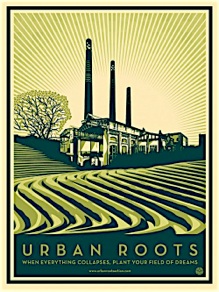Detroit was once a destination for car companies and youth trying to break into the music industry. Today, it’s now home to entrepreneurs looking to break into the urban farming business. In Detroit, a city that saw half its population move in the wake of economic collapse, many of the hopes of those who stayed behind hinges on urban farming.

Detroit’s efforts are captured in the documentary Urban Roots. For the film’s director, Mark MacInnis, the story he tells in the film is personal. “Every kid he knew had a mom or dad who worked in the car industry,” says the film’s producer, Leila Conners. ”His mom worked at a warehouse that distributed wiring harnesses for Ford Motor Company. And he saw how much people were impacted by his town falling apart and urban agriculture wasn’t something that everyone knew was going on because Detroit is a big city.”
Three years ago, when Conners was working on her film 11th Hour , a documentary about how we are at a tipping point with environmental destruction, that was narrated and produced by Leonardo DiCaprio, Mark showed her footage he shot of farmers in Detroit and she was impressed by what she saw . “I was looking at different ways of approaching sustainability and when I saw the footage of these farmers, it showed urban farming as part of a response to the post-industrial reality of cities like Detroit,” explains Conners. That footage laid the groundwork for Urban Roots.
The film illustrates how as the economy changes, people are forced to find different employment opportunities and adjust their consumption habits. “I think the biggest problem that industry created, besides all the pollution, is this mindset that people don’t have control – or that they don’t have to take responsibility for their own sustenance and security,” says Conners. “Most people don’t know where their food comes from. And the value of losing big industry is that people are learning that they can grow their own food and they don’t have to be dependent on food stamps. This is a huge concept because we have been trained to be consumers and not producers.”
As food security continues to become a problem in cities, communities will need to adapt more sustainable approaches to dealing with the growing challenges. Conners hopes that other cities will look at Detroit and realize that opportunities exist for farmers in urban setting. “What we see in the film is that the farmers are helping make Detroit a model for future urban planning. We see that farming needs to be included in urban planning in order to, in some way, address the current global food crisis,” she says.
While the film shows the progress that Detroit farmers have been making, Conners points out that challenges remain. Farmers will continue to be tested as Detroit gets smaller and competition increases over the land. While she points out that Wal-Mart has not come to Detroit, “it’s going to be battle over who wants the land: is the city going to let you farm on the land or let Wal-Mart move in?” Through her work on Urban Roots, Leila believes strongly in Detroit’s ability to move forward, “I’m optimistic about the future of urban farming because it makes people happy and because it provides an entry point for people to start focusing on a sustainable future which is important to future food security. I am very hopeful that it can make people change their mindsets and create healthy communities,” she concluded.
To help continue the momentum that the film has created, a portion of the proceeds from sales of Urban Roots goes to helping to establish gardens at high schools. It is clear that in Detroit and in cities around the world we are just seeing the beginning of urban agriculture. Urban Roots is also just the beginning – Conners has already started work on her next project, a film called Land of Plenty which will focus on food security.
By Graham Salinger

Danielle Nierenberg, an expert on livestock and sustainability, currently serves as Project Director of State of World 2011 for the Worldwatch Institute, a Washington, DC-based environmental think tank. Her knowledge of factory farming and its global spread and sustainable agriculture has been cited widely in the New York Times Magazine, the International Herald Tribune, the Washington Post, and
other publications.
Danielle worked for two years as a Peace Corps volunteer in the Dominican Republic. She is currently traveling across Africa looking at innovations that are working to alleviate hunger and poverty and blogging everyday at Worldwatch Institute’s Nourishing the Planet. She has a regular column with the Mail & Guardian, the Kansas City Star, and the Huffington Post and her writing was been featured in newspapers across Africa including the Cape Town Argus, the Zambia Daily Mail, Coast Week (Kenya), and other African publications. She holds an M.S. in agriculture, food, and environment from Tufts University and a B.A. in environmental policy from Monmouth College.








